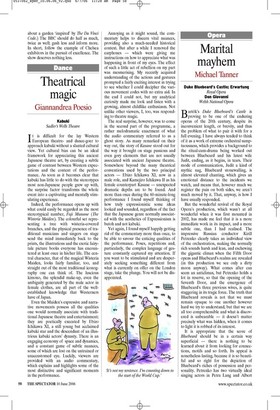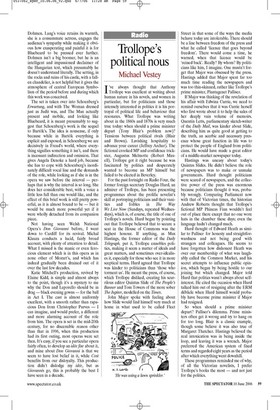Opera
Marital mayhem
Michael Tanner
Duke Bluebeard’s Castle; Erwartung Royal Opera Don Giovanni Welsh National Opera Bartók’s Duke Bluebeard’s Castle is proving to be one of the enduring operas of the 20th century, despite its inconvenient length, or brevity, and thus the problem of what to pair it with for a full evening. I have always tended to think of it as a work of extreme orchestral sumptuousness, which provides a background to the ritual-cum-drama being worked out between Bluebeard and his latest wife Judit, ending, as it begins, in tears. Their mode of communication, Judit a kind of mythic nag, Bluebeard stonewalling, is almost elevated chanting, which gives an emotional distance to the incidents we watch, and means that, however much we register the pain on both sides, we aren’t much moved by it. That, anyway, is how I have usually responded.
But the wonderful revival of the Royal Opera’s production, which wasn’t at all wonderful when it was first mounted in 2002, has made me feel that it is a more immediate work in its impact, and a more subtle one, than I had realised. The impressive Russian conductor Kirill Petrenko clearly takes an individual view of the orchestration, making the normally rich sounds harsh and lean, and eschewing the gigantic climax when the Fifth Door opens and Bluebeard’s realms are revealed (in this production we see only a dirty moon anyway). What comes after can seem an anticlimax, but Petrenko holds a lot in reserve, so that the opening of the Seventh Door, and the emergence of Bluebeard’s three previous wives, is quite staggering in its tragic force. The truth that Bluebeard reveals is not that we must remain opaque to one another however hard we try to understand, but that we are all too comprehensible and what is discovered is unbearable — it doesn’t matter precisely what was hidden, when it comes to light it is robbed of its interest.
It is appropriate that the score of Bluebeard should be in a certain way superficial — there is nothing to be learned about it from looking for connections, motifs and so forth. Its appeal is nonetheless lasting, because it is so beautiful and so right for the depiction of Bluebeard’s riches of possession and personality. Petrenko has two virtually ideal singing actors in Petra Lang and Albert Dohmen. Lang’s voice retains its warmth, she is a consummate actress, engages the audience’s sympathy while making it obvious how exasperating and painful it is for Bluebeard to be pressed ever further. Dohmen isn’t a big boomer, but he is an intelligent and impassioned declaimer of the Hungarian text, which presumably he doesn’t understand literally. The setting, in the rocks and ruins of his castle, with a fallen chandelier, is not helpful but it gives the atmosphere of central European Symbolism of the period before and during which this work was conceived.
The set is taken over into Schoenberg’s Erwartung, and with The Woman dressed just as Judit was, and The Man actually present and mobile, and looking like Bluebeard, it is meant presumably to suggest that Schoenberg’s work is the sequel to Bartók’s. The idea is nonsense, if only because while in Bartók everything is explicit and exposed, in Schoenberg we are decisively in Freud’s world, where everything signifies something it isn’t, and there is incessant indirection and omission. That gives Angela Denoke a hard job, because she has to cope with Schoenberg’s inordinately difficult vocal line and the demands of the role, while looking as if she is in the opera we saw before the interval — perhaps that is why the interval is so long. She does her considerable best, with a voice a little less full than one would like, and the effect of this brief work is still pretty powerful, as it is almost bound to be — but it would be much more powerful yet if it were wholly detached from its companion piece.
Not having seen Welsh National Opera’s Don Giovanni before, I went down to Cardiff for its revival. Michal Klauza conducts a lucid, fairly broad account, with plenty of attention to detail. What I missed is the manic or even ferocious element which is in this opera as in none other of Mozart’s, and which has indeed gradually been drained out of it over the last few decades.
Katie Mitchell’s production, revived by Elaine Kidd, is simple and almost always to the point, though it’s a mystery to me why the Don and Leporello should be in drag — black evening gowns — for the ball in Act I. The cast is almost uniformly excellent, with a smooth rather than rapacious Don from Christopher Purves — I can imagine, and would prefer, a different and more alarming account of the role from him. The opera is set in the mid-20th century, for no discernible reason other than that in 1996, when this production had its first outing, most operas were set then. It’s easy, if you see a particular opera fairly often, to develop an idée fixe about it, and mine about Don Giovanni is that we seem to have lost belief in it, while Così benefits from our disloyalty. This production didn’t dislodge my idée, but as Giovannis go, this is probably the best I have seen in a decade.



















































































 Previous page
Previous page